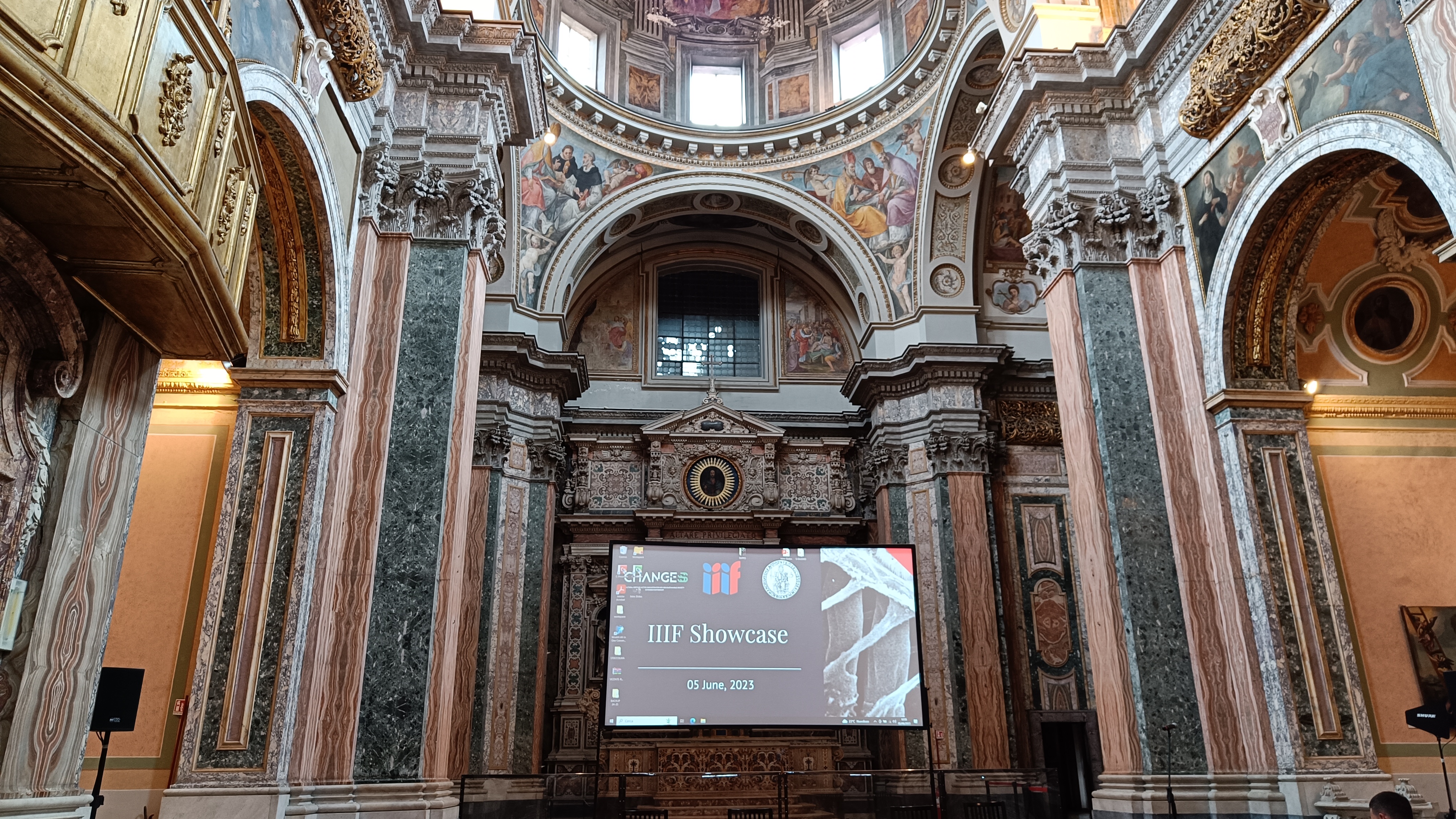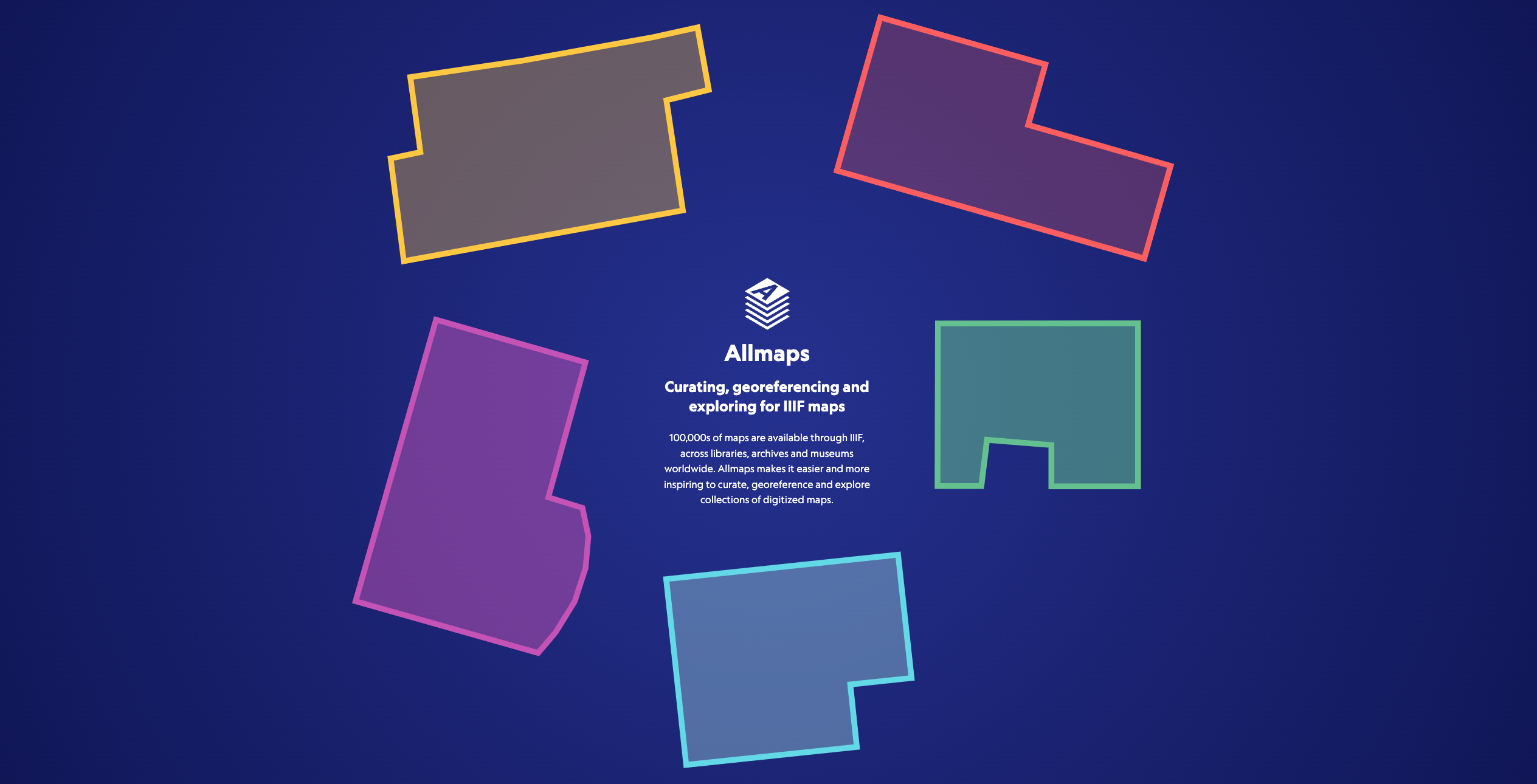This year's annual IIIF conference took place from 5 to 8 June in Naples. Lots of new developments and interesting projects, carried out by a variety of international institutions, were discussed. We gladly provide an insight into what is happening within the IIIF community.
The IIIF showcase, organised in the beautiful Chiesa dei Santi Marcellino e Festo, was mainly aimed at newcomers.
A general introduction to IIIF was followed by an update on recent progress within the 3D and Maps Groups. Regarding the 3D Group, among other things, it was indicated that a decision has been taken on which 3D standards will be used. Based on these standards, members of the 3D Group are currently working on some demos.
Within the Maps Group, the focus was on the navPlace extension and - viewer, that allow users to situate a collection/manifest/canvas on a map, and on the recently published Georeference Extension, which makes it possible to warp cartographic material over a contemporary map via the IIIF standards.
Thereafter, several institutions presented a concrete project concerning two important subjects within the field of digital humanities, notably crowdsourcing and storytelling. Jason Evans of the National Library of Wales explained their use of Wikidata/Wikidata Image Positions and the crowdsourcing tool Madoc. Andrea Zanni of MLOL zoomed in on MLOL Stories, a web-based tool for educational audiences that allows digital stories to be set up without prior knowledge of IIIF.
Finally, Glen Robson closed the showcase with an accessible roadmap for implementing IIIF within one's own organisation/institution.

The workshops provided an opportunity to delve deeper into some topics. For instance, The Flemish Art Collection and Ghent CDH encouraged IT professionals, heritage specialists and academics to brainstorm on the role of IIIF in online crowdsourcing. At the same time, explanations were given on ARK persistable identifiers. In short, these are stable references or web addresses that do not give a '404 Page Not Found' error.
In addition, two software packages were also explained and illustrated. The open source digital asset management system DSpace addresses the storage, access and preservation of digital content. The open source digital objects repository Archipelago is a set of Drupal modules and a configured Drupal instance for storing and presenting digital content.
A complete overview of all presentations from the IIIF conference can be found on the IIIF Consortium website. All presentations have been recorded and are available on the IIIF Consortium's YouTube channel.

Rein Debrulle (Ghent CDH/Flemish Art Collection) highlights some of the presentations:
- The IIIF Consortium staff gave an overview of some current internal developments. For instance, additional efforts will be made to broaden the user reach, including IIIF Guides (IIIF for Museums, IIIF for Researchers, ...), the IIIF Cookbook and IIIF Commons. There will also be more training sessions and updates of support materials.
- Allmaps, a webbased environment for georeferencing cartographic material based on IIIF standards, was officially presented. The platform is open source and free to use.
- As part of the ArchiOx project, a pipeline was developed to make hidden elements in historical sources visible. In addition to colour and dimension, attention is also paid to relievo capture. The images obtained are visualised via IIIF. The researchers use a plugin for Mirador that allows them to set the direction and intensity of the light.
- VIKUS Viewer allows to explore collections (IIIF presentation API v3) in their entirety. All images are presented in the same window. Images are classified by date and/or theme. The whole is also searchable via keywords.
- Manuscriptorium, a virtual collection/library of written cultural heritage, launched a new version. The platform has been transformed into a virtual research environment that allows users to navigate through the international collection, create their own collections and add and reuse annotations.
- The Galleria Borghese in Rome is working on a complete tour of the museum based on IIIF. This will transform each room into an IIIF collection with a 360° view and the various objects as components.
- MemoRekallIIIF is using Mirador's interface to form a tool that allows annotating videos and visualizing networks of manifests (collections of manifests that can be linked based on content similarity). The tool is still under development, but it is already possible to experiment within the sandbox setup.
- Canopy IIIF generates a static site based on an IIIF collection URL. This makes it possible to set up a digital collection platform, with search interface and metadata, with relatively few resources.
- IIIFprezi3 is a Python library for automatically generating and validating JSONLD files according to the standards of the IIIF Presentation API 3.0. The library is based on pydantic.
- Harvard University is working on an update of the Mirador Viewer. This update provides, among other things, a transition to React 18 (a frontend framework for building websites, https://legacy.reactjs.org/), the development of an oEmbed Service (a standard that allows to present integrated content on a website using a URL) and specific plugins (e.g. to add a logo or a help window; text search; convert a IIIF manifest to a PDF).
- IIIF Authorization Flow API 2.0 has been published and presented online. This flow describes the interaction patterns that can be used to shield access to images completely or partially.
- High Throughput JPEG 2000 (HTJ2K) is an update to JPEG 2000. Because it replaces the slow block coder, the decoding speed is significantly increased. At the same time, the size of the files is much smaller than with PTIFFs. As a result, this update can make the use of IIIF faster and cheaper.
Would you like more information about (one of) these projects? View the recording and/or slides of the presentations or send an e-mail to rein.debrulle@ugent.be.